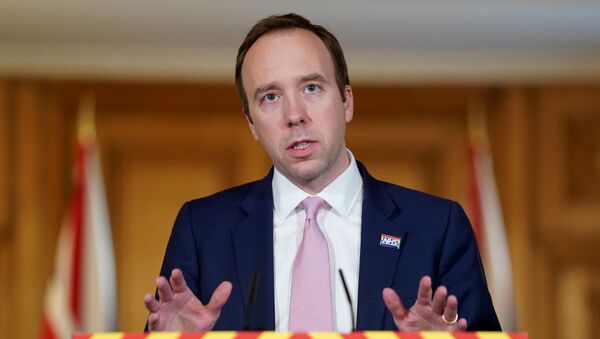A UK government document outlining possible responses to the coronavirus crisis, which openly advocates ‘targeted herd immunity’ as a strategy, directly contradicts strenuous denials by ministers the policy was ever under consideration.
Suggestions by officials in March that achieving herd immunity was a key aim were immediately and repeatedly rebutted by Health Secretary Matt Hancock - writing in The Daily Telegraph 14th March, he claimed Boris Johnson’s government had “a plan, based on the expertise of world-leading scientists” and “herd immunity is not a part of it…not a goal or strategy”.
He reiterated this position the very next day on the BBC’s Andrew Marr Show - however, a government planning document produced a week later shows a computer simulation of the impact of “targeted herd immunity” as part of a roster of “interventions” to counter the pandemic.
Piers Morgan - I can only draw one conclusion from our airports being open & for non essential workers being told to go to work.
— Haggis_UK 🇬🇧 🇪🇺 (@Haggis_UK) April 13, 2020
"The government is still operating a herd immunity strategy, they want people to get this."#coronavirus #GMB pic.twitter.com/PwjXj0xU7n
Given controversy over herd immunity, it’s perhaps unsurprising Hancock moved so quickly and aggressively to repudiate suggestions it was on the government’s proverbial drawing board, although his words in any event did little to ameliorate fears of health professionals that Whitehall actively planned to allow the majority of the UK population to get infected by COVID19.
Why So Serious?
Herd immunity is the protection of a population or large group from a contagious infectious disease. Typically this is achieved via vaccination, although group immunisation can develop via previous infection. The latter can be difficult to achieve and potentially produces a large number of serious illnesses and deaths, overwhelming health systems well beyond capacity. Once herd immunity has been established, a disease’s ability to spread is hindered, the disease can eventually be eliminated. It was via herd immunity vaccination that smallpox was eradicated in 1979.
The more infectious a disease, the greater the population immunity necessary to ensure herd immunity. For example, one individual with measles can infect up to 18 others, so 95 percent of people would need to be immune. Coronavirus conversely has a lower infection rate than measles, with each infected person passing it on to just two or three people on average.
Well your son is certainly enforcing that over 10 thousand deaths so far Stanley with his herd immunity policy 🏴👍😷 https://t.co/5Y7okDQhCw
— Wee L #Freedom....🏴🏴 (@l_ronaldson) April 13, 2020
There is no vaccine for Covid-19, which would necessitate herd immunity being achieved through infection rather than vaccination. However, it is as yet unknown whether the vast majority of people who recover from coronavirus will be immune as a result. It’s also often not possible to achieve herd immunity for very long. Viruses such as seasonal flu mutate frequently, evading a body’s immune response - hence the need for annual flu vaccinations.
Perspectives and More
Commenting on the strategy, Willem van Schaik, Professor of Microbiology and Infection, University of Birmingham, suggests it may take “a long time” before an effective vaccine becomes available or individuals develop natural immunity against the virus.
“Unfortunately, a very rough estimate suggests we will only reach herd immunity to Covid-19 when approximately 60 percent of the population is immune. The major downside is this will mean in the UK alone at least 36 million people will need to be infected and recover. It’s almost impossible to predict what that will mean in terms of human costs but we are conservatively looking at 10,000s deaths, possibly 100,000s,” he chillingly cautions.
You’re either a Tory or you support the NHS, you can’t be both as the former have spent decades destroying the latter and are currently waging herd immunity against people trying to save lives on the front line, pick a side
— 🧁🍰 Hoggy 🍪🍩 (@TheHoggy) April 13, 2020
The Professor believes the only way to make herd immunity work would be to spread millions of cases “over a relatively long period of time” so the NHS does not get overwhelmed. Social distancing could contribute to this, he suggests, and “clearly the UK government believes this process is manageable and building up herd immunity is the most effective way to stem Covid19”. He notes however the UK is the only country in Europe to follow this strategy, and the source of this “laissez-faire attitude” is unclear to him.
He concludes by warning while Covid-19 is “not as bad” as the Spanish flu, which had a “considerably higher” case fatality rate, coronavirus will “probably” be comparable to that outbreak in terms of its societal impact.




